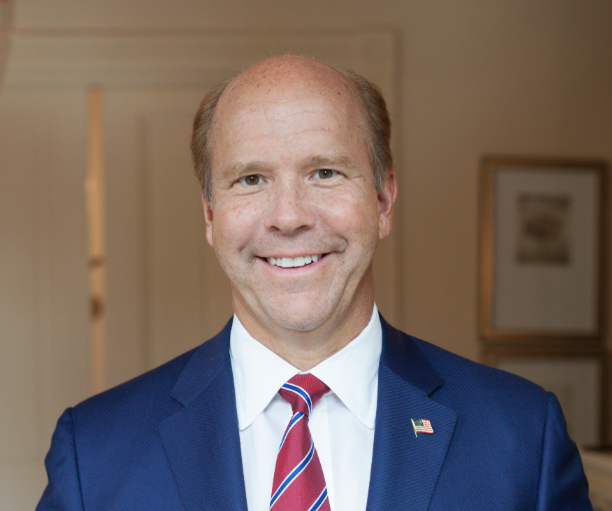
Former Maryland Rep. John Delaney announced he was giving up his seat in Congress with an op-ed in The Washington Post almost two years ago. In the piece, Dulaney, who represented Maryland’s gerrymandered 6th District for three terms, said a lot of the usual stuff—“The American people are far greater than the sum of our political parties,” “our government is hamstrung by excessive partisanship,” and the like.
He also included the typical bit about how his vision for the country is based on his “own American Dream.” Translated, he means his dad was a union electrician, but he went to college and became a very successful entrepreneur. In fact, Dulaney launched and led two financial services companies—Health Care Financial Partners and Capital Source—that ultimately were traded publicly on the New York Stock Exchange.
Two years on the road, traversing Iowa (he’s visited all 99 counties) and New Hampshire (more than 15 visits) on his own dime, Delaney finally gets some national television spotlight tonight. Well, at least 1/20 of piece of it. The only Marylander in this year’s contest, Delaney will join Sen. Elizabeth Warren, Sen. Cory Booker, Gov. Jay Inslee, former Rep. Beto O’Rourke, Sen. Amy Klochuchar, New York Mayor Bill de Blasio, Rep. Tim Ryan, and Rep. Tulsi Gabbard on stage on the first night, of the two-evening, first Democratic presidential debate of 2020.
The major networks and cable stations plan to broadcast the 9-11 p.m. debates Wednesday and Thursday. Round two tomorrow night includes: Former Vice President Joe Biden, Sen. Bernie Sanders, Sen. Kamala Harris, Mayor Pete Buttigeg, Sen. Kirsten Gillibrand, Sen. Michael Bennet, former Gov. John Hickenlooper, Rep. Eric Swalwell, author Marianne Williamson, and entrepreneur Andrew Yang.
Outside of Maryland (and maybe inside parts of the state, too), Delaney may be the least known of the bunch. With that in mind, here’s five things to know about the former Congressman.
1. He’s a centrist.
In primary races, the more liberal voices on the Democratic side and more conservative voices in Republican contests tend to attract the most attention and copy. Delaney told WMUR that he doesn’t think “centrist . . . is a dirty word. He’s a free trader. He does not support Medicare for All bill proposed in the U.S. Senate or the Green New Deal.
2. He supports a modest corporate tax increase.
Delaney says he would like to see the corporate tax rate raised from 21 percent to 25 percent.
3. He’s polling at 2 percent.
In other words, there are a lot people ahead of him. Delaney says he decided to enter the race after Hillary Clinton lost to Donald Trump. “That moment made me think we have to think differently about everything,” he says. “And stop pitting American against American . . . We have to focus on getting things done we agree on.” What Delaney needs to do tonight is put forth who he is and what he stands for in a compelling bit-size (because that’s all the time he’ll get) narrative.
4. He’d trade support for Trump’s wall for “Dreamer” protections.
Delaney has said he’s willing to increase funding to build more steel barriers along the Southern border if it means creating a pathway to U.S. citizenship for the estimated 1.8 million “dreamers”—younger immigrations who were brought here by their parents.
5. He thinks Wall Street regulation is basically fine as is.
When asked, Delaney says he believes “first and most importantly” banks in this country are “well capitalized and safe.” “I think Elizabeth Warren believes the banks are a bigger risk than they are . . . “they’ve been appropriately regulated since the last financial crisis.” Other economic issues, including the threat of technology to jobs, are more important to focus on, he says.
“Delaney does—in his own (way)—present something different from the rest,” said Mileah Kromer, who oversees the Goucher Poll as the director of the Sarah T. Hughes Field Politics Center told WAMU. “At least different from the more progressive wing of the party.”
